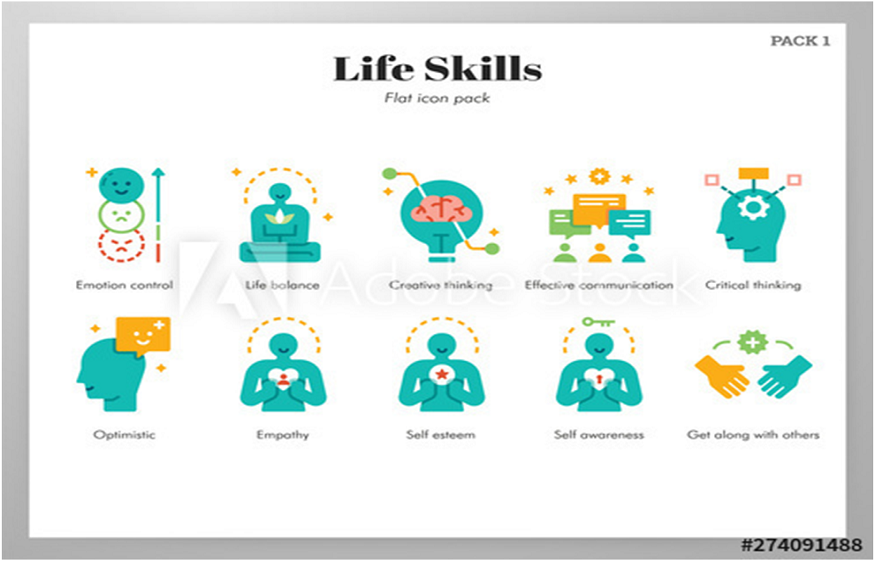Teaching a gifted child how to handle everyday situations isn’t just about surviving the day- it is about empowering them to live fully and independently. As a parent, caregiver, or educator, when you focus on building life skills, you are not only preparing a child for daily routines but also improving their confidence, emotional well-being, and social participation.
The World Health Organization reports that about 15% of people worldwide have some disability, showing just how many families can benefit when you prioritize teaching these vital self-help skills.
That is a significant portion of families and communities who can benefit when we prioritize essential self-help skills. So, let’s learn thelife skills for children with special needsthat you can focus on from your next session.
Top 10 Self-Help Skills for Special Needs Children to Thrive Independently
Educators who graduated from Online SEN Courses in Singapore, suggest that the following skills are helpful for Special Education Needs (SEN) children:
1. Communication
Communication is one of the most important skills for every human being, and for children with special needs, it’s often the key that opens the door to the world. Whether your child is verbal or non-verbal, finding the right way to express thoughts, needs, and feelings is vital.
Children who cannot speak fluently can benefit greatly from AAC (Augmentative and Alternative Communication) methods such as:
- Sign language.
- Picture exchange communication systems (PECS).
- Speech-generating devices.
- Communication boards.
These methods help children express what they want, how they feel, and what they need- helping reduce frustration, build relationships, and make daily routines easier. With consistent use and encouragement, many children improve their communication abilities, which positively affects every other area of life.
2. Daily Living Activities
Tasks like brushing teeth, bathing, getting dressed, or even washing hands may seem routine for adults. For children with additional learning or developmental needs, mastering daily self-care routines becomes a crucial part of their journey toward greater independence. Start by teaching one small step at a time. For example:
- Practice brushing teeth with a visual schedule.
- Use easy-to-wear clothes to teach dressing skills.
- Break tasks into simple steps and use rewards to celebrate progress.
The child begins to understand sequences, routines, and personal responsibility. These abilities allow them to take charge of their care- an empowering experience for both the child and their caregivers.
3. Household Chores
Including children in basic household chores is a wonderful way to build responsibility and give them a sense of belonging. Plus, it’s a great opportunity to develop fine motor and gross motor skills, depending on the task. Here are a few simple chores to start with:
- Folding small towels or clothes.
- Helping set the table.
- Putting away toys or books.
- Wiping surfaces with a cloth.
Performing simple chores can improve motor abilities, improve focus, and support overall physical coordination in children with special needs. Most importantly, children feel useful and connected to family routines, which builds their confidence.
4. Functional Math
Math isn’t just for the classroom. For special needs children, functional math plays a big role in helping them navigate the real world. Start teaching them:
- How to recognize numbers and count them.
- Tell time using clocks or digital watches.
- Handle money- coins, notes, and basic transactions.
- Understand patterns in daily routines (e.g., days of the week).
This makes it easier to shop at the store, follow schedules, understand change from a purchase, and eventually handle a simple budget. Over time, these skills can prepare them for part-time jobs and independent living.
 Source:maryogradylifecoach.com
Source:maryogradylifecoach.com
5. Functional Reading
Being able to read isn’t just about books. Functional reading allows children to interact with the world more confidently. You can help the child to:
- Read basic signs like ‘Stop,’ ‘Push,’ or ‘Exit.’
- Recognize names (their own, family members, or school labels).
- Understand symbols and instructions on the packaging.
- Read picture menus, labels, or simple maps.
By learning how to read everyday cues, the child becomes more independent and safer in public spaces. This form of reading is often more useful than academic reading when it comes to practical life.
6. Understanding Emotions and Self-Control
Children with special needs may sometimes struggle to manage their emotions, especially in social or unfamiliar situations. Learning how to recognize their own feelings- and those of others- can go a long way in helping them behave appropriately. Here’s how to support this:
- Use emotion cards or facial expression charts to teach feelings.
- Model emotional responses: ‘You look upset. Do you want a break?’
- Practice breathing techniques or calming routines when frustrated.
Self-regulation doesn’t happen overnight, but with consistent modeling and support, children learn how to pause, think, and respond more effectively. This creates smoother transitions and fewer meltdowns.
7. Social Skills
Making friends doesn’t come naturally to every child. Children with special needs may need extra support to learn how to start conversations, share toys, or play in groups. Try teaching:
- How to say hello and introduce themselves.
- How to wait for their turn.
- How to ask or answer questions politely.
- How to show empathy or say sorry.
Use role-playing, visual cues, or structured playdates to reinforce these skills. Strong social skills help children feel included, reduce isolation, and build a support network.
8. Leisure Activities
Leisure time might sound like free play, but it’s actually an important part of emotional development and motor learning. Whether it’s art, music, games, or physical play, children grow through creative expression.Benefits of engaging in leisure activities include:
- Improved hand-eye coordination.
- Reduced anxiety and stress.
- Better peer interaction.
- Discovering passions and talents.
Encourage your child to explore different hobbies. Dance, painting, music, or even nature walks can become powerful tools for self-expression and joy.
9. Work-Ready Skills
Children grow up fast, and it’s never too early to introduce basic vocational skills. These skills build the foundation for future employment and independence.Start with:
- Time management using timers or schedules.
- Completing assigned tasks (like packing a bag or organizing items).
- Understanding responsibility and following instructions.
- Practicing appropriate behavior (e.g., polite greetings, dress codes).
Even if your child isn’t ready for a job yet, learning structure and responsibility now sets them up for success later.
10. Community Living
Being part of a community gives children a sense of identity and purpose. Community living skills go beyond the home- they teach children how to interact in public spaces and feel like they belong.You can practice this through:
- Visiting local parks or community centers.
- Attending social events, festivals, or volunteer opportunities.
- Mastering the art of seeking assistance in public spaces.
- Teaching safety rules (crosswalks, asking strangers, etc.).
Over time, they gain exposure to new environments, make new friends, and feel proud of their contribution.
Bottom Line
Educators and parents who have completed Special Education Courses in Singapore are aware that teaching life skills to children with special needs is a powerful way to foster confidence, independence, and connection. So, start today. Start small. And watch them grow into independent, happy individuals who thrive in the real world. Because every child, with the right tools and support, deserves that chance.



